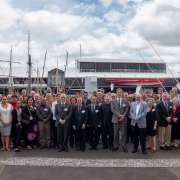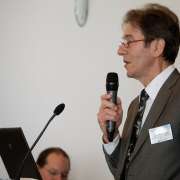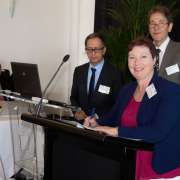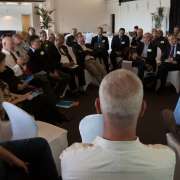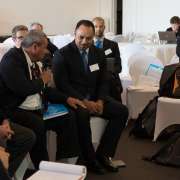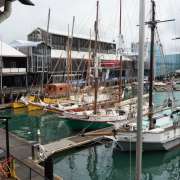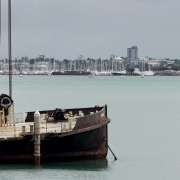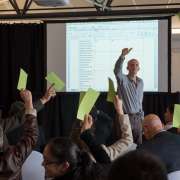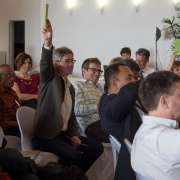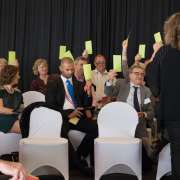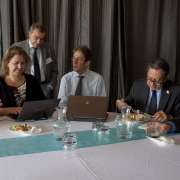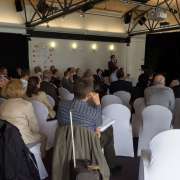Main menu
EU-Pacific bi-regional dialogue platform: Science diplomacy to serve policy demands
With this first bi-regional dialogue platform, PACE-Net Plus intends to support the recognition of the fundamental importance of ST&I in the sustainable development of Pacific Island Countries and in the policy dialogue between the EU and Pacific Region.
Background
PACE-Net Plus is the second project funded by the European Commission to further bi-regional ST&I cooperation between the Pacific Region and the European Union.
Many societies around the world face challenges in the areas of health and wellbeing, food-security, terrestrial and marine resource management, and the impact of climate change. In the Pacific region, some of these challenges are compounded by geographic and socio-economic issues unique to the region. Scientific research, technological development, and innovative approaches all play important roles in assisting Pacific Island nations to address these challenges.
The opportunities for European and Pacific researchers to collaborate are many and diverse. EU policy and scientific strategies aim to reinforce these collaboration opportunities, notably through Horizon 2020, the European Union’s framework programme dedicated to research and innovation. This year, PACE-Net Plus organised several think-tanks, which sought to update and identify research priorities, innovation areas, and to develop preliminary ideas for joint initiatives and activities for EU-Pacific ST&I cooperation in the fields identified in Horizon 2020.
Strengthening bi-regional dialogue in ST&I, a core component of PACE-Net Plus, is a key step towards achieving increased EU-Pacific collaboration to address the societal challenges. The gaps in this dialogue and the absence of an ST&I structural framework at regional and often national levels in the Pacific region are both limiting factors. To address the lack of a structured forum for bi-regional ST&I policy dialogue, PACE-Net Plus plans three bi-regional platforms to increase recognition of the fundamental importance of ST&I in the sustainable development of Pacific Island Countries and in the dialogue between the EU and Pacific Region. The first will be held in December 2014 and will discuss policy recommendations from the six Think Tanks.
Think Tank Themes
- Non communicable diseases and lifestyle options for improved nutrition and well-being
- Convergence of science and traditional knowledge in aqua- and agriculture for sustainable, healthy living in the 21st century
- Enhancing community resilience: managing environment, water and wastes under a changing climate
- Infectious diseases in the Pacific: EU-Pacific bi-regional cooperation
- Coastal ecosystem disturbances, fish and shellfish poisoning and their socio-economic implications
- Reconciling mining and the sustainable development in the Pacific countries
- Observation systems of the impacts of climate change in the Pacific for a sustainable environment and a better management of terrestrial and maritime resources (planned in March 2015)
Dialogue suggestions
- Why do we need this bi-regional relationship in ST&I?
- To contribute to a Pacific ST&I Policy Framework and a EU-Pacific cooperation strategy
- To provide scientific evidence for public policies in both the EU and the Pacific
- To address the specific needs/concerns of the PICTs that do not have innovation/research systems; to contribute to capacity building (including mobility)
- To contribute to the study and management of global changes for the benefit of the EU and the Pacific Region
- To develop the necessary research infrastructure in the Pacific
- To identify and promote thematic areas of excellence (one of the pillars of H2020)
- To strengthen the relation between private and public sectors, to facilitate the uptake of scientific results and encourage the identification of specific innovation areas, thus creating employment
- To identify and validate ideas on potential joint activities/initiatives
- To use Horizon 2020 and other opportunities to address EU-Pacific research priorities.
- Which joint process can foster the bi-regional dialogue?
- What is the best model for supporting the ST&I dialogue (use of a task force; facilitate informal dialogue between stakeholders on cooperation policy issues of relevance to both regions; convening of a formal policy dialogue platform; drawing on models that already exist)?
- What relationships with existing Pacific regional institutions / or fora (e.g. PIF, SPC, SIDS, etc.) should PACE-Net Plus focus on strengthening?
- How best to establish cooperation priorities (mutual interest & global concern): if necessary, ST&I topics can be included in other established dialogues, such as trade, investment or development, to better ensure all parties see added value in such cooperation.
- Could a future international cooperation project become the secretariat of such a dialogue platform?
- How to support Pacific regional networks of research actors, and to link within and/or with this dialogue platform?
- How to enhance Pacific actors’ participation in Horizon 2020 (development of a National Contact Point system) and European actors in Pacific programmes?
Expected outcomes
The Pacific Europe Network for Science Technology and Innovation will bring leading researchers, policy makers and innovators together to:
- Contribute to a Pacific ST&I Policy Framework and an EU-Pacific cooperation strategy.
- Contribute to analysing the Think Tank results and working towards implementing the recommendations.
- Agree on how to improve ST&I focus, and strengthen national ST&I systems.
Target Group
- Policy makers and senior officials from government departments
- Senior officials from regional organisations
- Senior scientists
- Representatives of funding organisations
Next platforms
The contents and the audience of the platform will contribute to developing a concept for implementing a long-term bi-regional dialogue strategy between the regions of Europe and the Pacific. This platform leads the work to be endorsed at future platforms in Brussels (Belgium) in mid 2015 and in Suva (Fiji) in mid 2016 — focussed on the pathways to innovation.
|
Sheikh Izzal Azid Faculty of Science and Technology and Environment The University of the South Pacific Phone: +679 32 32859 Mobile: +679 92 11622 e-mail: azid_s@usp.ac.fj |
Prof. Jean-François Marini PACE-Net Plus coordinator IRD, 101 Promenade Roger Laroque BP A5 – 98848 Noumea (New Caledonia) Phone: +687 26 07 47 e-mail: jean-francois.marini@ird.fr |
EU-Pacific bi-regional dialogue platform: Science diplomacy to serve policy demands



